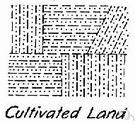Over the
ploughland riding was utterly impossible; the horse could only keep a foothold where there was ice, and in the thawing furrows he sank deep in at each step.
Hilbery dropped into a pleasant, inattentive state of mind, in which she was conscious of the running green lines of the hedges, of the swelling
ploughland, and of the mild blue sky, which served her, after the first five minutes, for a pastoral background to the drama of human life; and then she thought of a cottage garden, with the flash of yellow daffodils against blue water; and what with the arrangement of these different prospects, and the shaping of two or three lovely phrases, she did not notice that the young people in the carriage were almost silent.
At last he climbed a fence, thinking to drop into the road, and found himself staggering, instead, among the iron furrows of a
ploughland, endless, it seemed, as a whole county.
Casson's agreed over their pipes that no man in his senses would take the Chase Farm unless there was a bit more
ploughland laid to it.
There being little
ploughland, and few woods, the Vale is only an average sporting country, except for hunting.
Local children had gone there skating in spring and autumn as recently as in the 1950s; the water disappeared after the oil shale mine was expanded (Kohtla oil shale mine was active in 1937-2001) and in the 1960s the former meadow became
ploughland (pers.
Unit 32.1.3 of Regulations of Cadastre indicates that factual landed property cartographed during cadastral measurements in the location are: built-up territorial border (land occupied with buildings, yards and fields, or other land used for direct building exploitation), transport engineering buildings (communications), other roads (not formed as buildings), border of water body and hydrographical net, forest line, line of
ploughland, gardens, meadows and natural greenlands and otherland that is composed from trees and bush plantations, swamp line, affected land--areas of exploitable and exploited mineral quarries, peatbogs and dumps.
In the first-ever Grand National, started by Liverpool hotelier William Lynn, 17 horses ran over
ploughland.
Send questions to Sharon Waugh, West Yorkshire Police Authority,
Ploughland House, 62 George St, Wakefield or email: sw1@wypa.pnn.police.uk or call 01924 294021.
In the Mesopotamian Epic of Creation, the absolute ruler, Marduk, slays the bull man (kusarikku, or "bison") so that he may become "the bestower of
ploughland who fixes [its] boundaries, creator of grain and linseed, producer of vegetation" (Tablet VII).
In the mid-sixteenth century, Hugh Latimer, Bishop of Worcester, subsequently burnt at the stake at Oxford, complained in a sermon before the boy King Edward VI of the effects of landlords attempting to increase the cash yield of their property: enclosures of
ploughland to provide grazing for sheep meant that 'where as have been a great many householders and inhabitants there is now but a shepherd and his dog'; and as for increase in rents.
It was recorded as having a mill, a priest - and therefore probably a church - some woodland and
ploughland.
 ploughland - arable land that is worked by plowing and sowing and raising crops
ploughland - arable land that is worked by plowing and sowing and raising crops